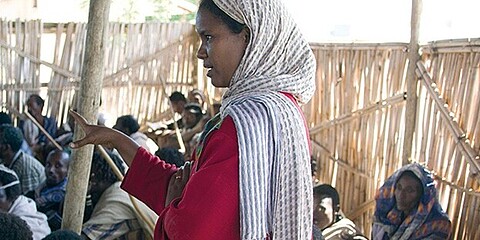
Supporting Gender Equality in Post-conflict Contexts
Gender equality and peacebuilding are two key objectives of German development cooperation. But are both objectives and their interlinkages taken into account sufficiently when putting development policy into practice? A DEval evaluation in several post-conflict countries seeks to answer these questions.
More and more German development programmes and projects are implemented in fragile contexts. This refers to circumstances where the state monopoly on violence is not reliably upheld and the state is not in a position to provide basic social services. Frequently these are countries affected by conflicts, the consequences of which often affect women especially severely.
At the same time, women are known to play a decisive role in conflict prevention and in peacebuilding. To protect the rights of women and to include them equally in peace negotiations and conflict resolution are therefore essential goals of UN Resolution 1325, which was adopted by the United Nations Security Council on 31 October 2000. The German Federal Government has translated these goals into national strategies.
Gender mainstreaming is the integration of a gender perspective into all development policy strategies and projects. It enables German development cooperation to consistently take account of the gender aspects specific to each context it works in. With this in mind, the question that arises is to what extent gender mainstreaming within German development cooperation in post-conflict contexts results in the delivery of activities that contribute to gender equality, and hence also to more peaceful and inclusive societies. To answer this question, DEval analysed 47 projects carried out by German official development cooperation in 11 post-conflict contexts.
The question was addressed in terms of two dimensions:
- the process dimension, meaning the level of planning and activities
- the outcome dimension, meaning the level of project effects
Main Findings and Recommendations
- The existing procedures for gender mainstreaming are suitable in principle for anchoring the promotion of gender equality in post-conflict contexts.
-
Studies on the outcome level show that in areas such as “overcoming trauma” and “increasing income”, individual projects achieve relevant outcomes. These do not only meet practical needs but also contribute to empowering women and changing gender roles.
- In practice, however, the procedures are rarely used in a way that consistently anchors the promotion of gender equality in the projects.
-
Their potential is therefore not being maximised systematically enough.
- The evaluation recommends that the German Federal Ministry for Economic Cooperation and Development (BMZ) should anchor the promotion of gender equality in post-conflict contexts at the strategic level.
-
The same applies to the implementation of the “Women, Peace and Security” Agenda. Furthermore, these goals should be reflected in the country strategies.
- In every post-conflict country, the BMZ should examine whether to promote a project that pursues peace and security along with gender equality as principal objectives.
-
Such projects are especially relevant in post-conflict contexts and support the implementation of the “Women, Peace and Security” Agenda.
- The BMZ and the implementing organisations should consistently institutionalise protection and complaint mechanisms against sexual misconduct.
-
Sexual and gender-based violence is widespread in many post-conflict contexts even after the conflict has ended. Development cooperation projects must respond to this environment and minimise the risk that the projects could leave target groups or staff exposed to sexual violence or exploitation.
The evaluation was completed in 2021. This is a summary of the results and recommendations; you can find the complete results and recommendations in the report.
Background
A large proportion of the partner countries of German development cooperation are affected by conflicts. UN Resolution 1325 and its follow-up resolutions underline the role of women in peacebuilding and conflict prevention, and emphasise the relevance of gender-sensitive approaches and the protection of women’s rights in post-conflict contexts. The German Federal Government has transposed these provisions into national strategies. Of these, the interdepartmental National Action Plan for the implementation of UN Resolution 1325 (NAP 1325) is of particular relevance for the work of the Federal Ministry for Economic Cooperation and Development (BMZ). The Development Policy Action Plan on Gender Equality 2016–2020 also includes “Armed conflicts, peacekeeping and displacement” as a sectoral thematic area. Likewise, gender equality is part of the BMZ’s "Development for Peace and Security" strategy.
Methods
The evaluation follows a theory-based evaluation approach in order to compare the conceptual-theoretical assumptions about the gender mainstreaming process with the practical implementation of gender mainstreaming in development cooperation, and with the results achieved. A multi-method design was used to analyse strategy papers and procedural documents. 47 projects in 11 post-conflict countries (Burundi, Colombia, Ethiopia, Georgia, Liberia, Nepal, Pakistan, Rwanda, Sri Lanka, Uganda and Ukraine) were analysed, and case studies conducted in four countries (Colombia, Liberia, Pakistan and Sri Lanka).
Team
- Dr Sabine Brüntrup-Seidemann Former Evaluator - Team Leader
- Dr Angela Heucher Senior Evaluator - Team Leader, Gender Equality Officer
- Verena Gantner Former Evaluator
- Ida Wiborg Former Evaluator DEval
Contact
Dr Angela Heucher
Phone: +49 (0)228 336907-938
E-mail: angela.heucher@DEval.org
Dr Martin Bruder
Phone: +49 (0)228 336907-970
E-mail: martin.bruder@DEval.org
Related Documents
Publications
- Policy Brief: Human Rights in German Development Cooperation: Mainstreaming and Effectiveness in Private Sector and Financial System Development
- Policy Brief: Menschenrechte in der deutschen Entwicklungszusammenarbeit: Verankerung und Wirksamkeit in der Privatsektor- und Finanzsystementwicklung
- Policy Brief: Feministische Entwicklungspolitik: Umsetzungshinweise für eine menschenrechtsbasierte und gendertransformative Entwicklungszusammenarbeit
- Supporting Gender Equality in Post-conflict Contexts
- Policy Brief: Promoción de la Igualdad de Género en Contextos Posconflicto
- Policy Brief: Supporting Gender Equality in Post-Conflict Contexts
- Policy Brief: Förderung der Gleichberechtigung der Geschlechter in Post-Konflikt-Kontexten
- Förderung der Gleichberechtigung der Geschlechter in Post-Konflikt-Kontexten
- Lessons from Evaluation. Issue 2: Gender Equality in Education

